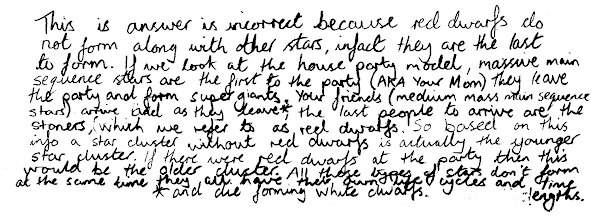Cuesta College, San Luis Obispo, CA
An astronomy question on an online discussion board[*] was asked and answered:
Pd: Two star clusters both have white dwarfs, but one also has red dwarfs, while the other does not. Which star cluster is older?Discuss why this answer is incorrect, and how you know this. Explain using the properties and evolution of stars.
inj: Since red dwarfs form along with the other types of stars, and last for trillions of years, the star cluster without red dwarfs is very old.
[*] answers.yahoo.com/question/index?qid=20140413103436AAz1e8m.
Solution and grading rubric:
- p:
Correct. Understands that:- low-mass stars evolve slower than medium-mass stars; and
- red dwarfs are low-mass stars that have finally reached their main-sequence stage, while white dwarfs are the remnant of medium-mass stars (after going through its main-sequence, giant and planetary nebula phases), such that a star cluster with red dwarfs must be older than a cluster without red dwarfs.
- r:
Nearly correct (explanation weak, unclear or only nearly complete); includes extraneous/tangential information; or has minor errors. One of two points correct, other is problematic/incomplete. - t:
Contains right ideas, but discussion is unclear/incomplete or contains major errors. Both points problematic/incomplete, or one point correct while other is missing. - v:
Limited relevant discussion of supporting evidence of at least some merit, but in an inconsistent or unclear manner. Some discussion of stellar evolution, mass and main-sequence lifetimes. - x:
Implementation/application of ideas, but credit given for effort rather than merit. Discussion not based on properties and evolution of stars. - y:
Irrelevant discussion/effectively blank. - z:
Blank.
Section 30674
Exam code: midterm02n4iL
p: 13 students
r: 1 student
t: 3 students
v: 8 students
x: 3 students
y: 0 students
z: 0 students
Section 30676
Exam code: midterm02sh7F
p: 22 students
r: 4 students
t: 4 students
v: 7 students
x: 5 students
y: 0 students
z: 0 students
A sample "p" response (from student 0123):

Another sample "p" response (from student 1125):

Yet another sample "p" response (from student 7342):

No comments:
Post a Comment